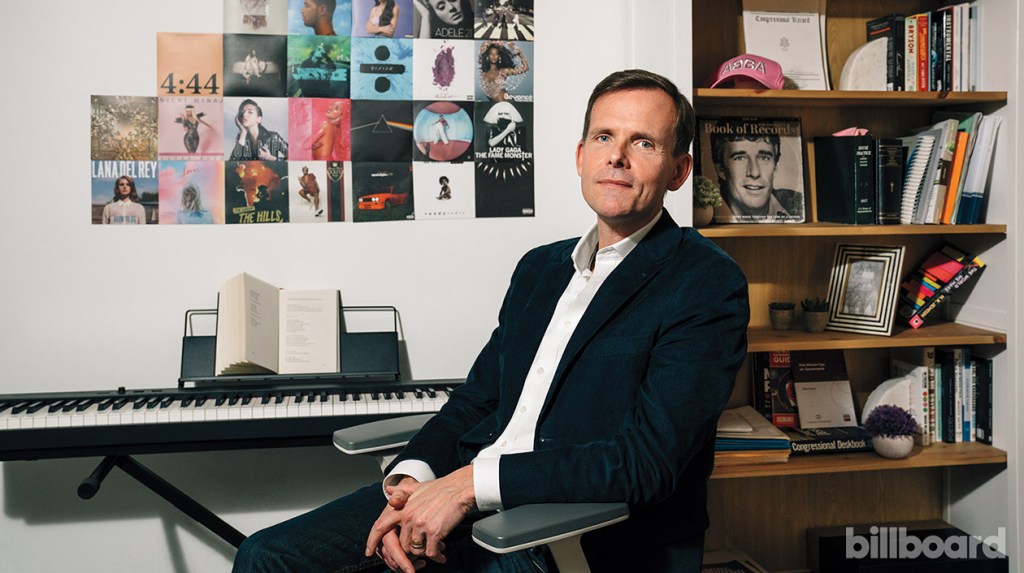When it comes to songwriters' income, streaming services are seen as both heroes and villains: they saved the music industry from rampant piracy, but, some say, pay most creators too little. In his first interview as the new president/CEO of the Digital Media Association (DiMA), Graham Davies he says he's focused on convincing the industry they're the good guys.
Davis took the top role at the US agency — which represents the interests of Amazon, Apple Music, Pandora, Spotify, YouTube and feed.fm — in January, succeeding the agency's longtime leader, Garrett Levin.
Before taking the job, he worked on the other side of the negotiating table as head of the Ivors Academy, the UK's leading songwriters' advocacy organisation. It's a career change on par with becoming a district attorney defense attorney, but Davies says his extensive knowledge of the needs of songwriters will help him make a real impact at DiMA.
A classically trained pianist, Davies began his career in the mid-1990s at British collecting company PRS for Music, where he helped transition the more than 100-year-old organization from physical to digital at a time of great uncertainty and low record collections. . He also worked with the Swedish and German performing rights organizations (PROs) to create the International Corporate Enterprise, a licensing and processing hub serving more than 250,000 rights holders and multi-territorial digital music companies that combined and modernized back offices of societies.
In 2018, Davies became Chief Executive of the then British Academy of Songwriters and Composers and decided the organization needed a better fundraising initiative, greater outreach to other industry partners and, he says, a “stronger voice” among songwriters. As one of the first orders of business, he renamed BASCA the Ivors Academy to align with the best-known and most successful part of the organisation, the Ivor Novello Awards, named after the Welsh singer, songwriter, actor and playwright who was one of most respected British performers of the first half of the 20th century.
Davies also formed partnerships with other musicians' unions and groups for greater advocacy reach, including the Musicians Union, the Music Producers Guild, and the Featured Artist Coalition. He teamed up with songwriter Tom Gray to promote the grassroots campaign #BrokenRecord, which called for improved rights and pay for UK music creators and, says Davies, made “radical progress in membership and board diversity”.
To do all this, Davies says the academy needed money, and that's where his relationship with streaming services and DiMA began. He connected with Apple Music, Amazon Music and Levin for funding and support.
Davies now plans to rebrand DiMA as a global organization to, as he puts it, “educate about the value streaming services bring to the music business” and advocate for its members on legislation and other global issues.
In the wake of the controversial five-year Phonorecords III proceedings by the Copyright Board (CRB), which tarnished DiMA's relationship with music publishers, Davies says he plans to use his background in publisher and songwriter advocacy to find areas of “common ground”. so that the two sides can navigate the era of artificial intelligence (AI) together.
Why do you think you are the right fit for DiMA?
I see this as the new beginning of DiMA. Of [the progression] of things that began to happen during Garrett Levin's tenure. Now DiMA is evolving into a more global voice for streaming music. This is the core of our vision and strategy. Not being USA makes sense for this vision. Music streaming is a global industry and many of the issues are the same across jurisdictions. However, we will certainly continue to have a very strong United States focus on the activities here.
What's on the docket for your first year?
The first is to ensure that DiMA is visible. It's important that people see that DiMA builds on Garrett's legacy. I'm also in the listening phase to hear everyone's views and combine them with what I know from my time in the UK.
What message do you want to send to the industry?
[There is still] pressure on services to pay more to the industry. People want to know where the money is going. How much are streaming services paying the industry through both royalty payments and investment? There are extremely worthwhile investments our members are making — and more [regarding] consumer wants and needs in the evolving streaming market. They fund many initiatives in various regions to promote a healthy music pipeline. For example, there is a Rising Star program at Ivors Academy that was funded by Apple and is now funded by Amazon. I'm not sure there's enough awareness and I'm ready to promote this training.
What do you say to songwriters who criticize your move to the other end of the table?
I think so [my desire to] listen and understand where everyone is coming from and finding common solutions is really seen as positive. To have someone who has worked from a PRO perspective, a songwriter who advocates even now [represents] Streaming services are good. There will be some points of difference. You know, a CRB deal is a CRB deal. But so far, the vast majority of votes have all been positive.
For Phonorecords IV, DiMA members teamed up with the National Association of Music Publishers [NMPA] and the Nashville Songwriters Association International to reach an agreement. This was seen as a significant improvement from the Phono III, which took five years to establish a rate and was quite controversial. Do you foresee similar collaborative CRB negotiations in the future?
There is an absolute need for a close connection between rights holders and streaming services, because if the streaming market doesn't thrive, hardly anyone does. Our successful arrangement with the Phono IV was a great indicator of our ability to tune. I have big shoes to fill, but I hope to build on that. I think everyone is looking for as much cooperation as possible.
How will AI affect DiMA members?
What we are looking at most intensively right now is the personhood legislation that is being debated in the United States. We believe that there should be adequate safeguards to protect an individual's personality—name, image, likeness, and voice—but the law must be appropriately binding for all parties.
We favor a federal approach as opposed to a patchwork of state laws. It must balance the individual's ability to control it and the fundamental protections underlying the flow. Secondary liability has really given our members certainty. The focus should be on those directly involved in producing content that is problematic without shifting that responsibility to streaming services. There is a lot to discuss in this.
Does this mean you are in favor of creating a process to take down works that infringe on an artist's right of publicity, similar to how the Copyright Act works in the digital age for copyright infringement?
Correctly. There has been clarity on the issue of liability to date, and this has provided certainty [for the streaming services.]
What else will you focus on in your first year?
The organization of licensing and operations. You'd expect that coming from my background. I am used to collective management companies and back-office entities that focus on transparency, efficiency and neutrality.
The Music Modernization Act is a truly great example of the industry coming together to solve problems with effective and efficient solutions. I think we believe that the process of redefining the Engineering Collective Licensing is very important [example] where MMA was successful. The process of redefining is an important process to talk to everyone involved, understand what is working, what is not working and where we can improve. We certainly see areas that need to be addressed [at the MLC].
Can you elaborate on the process of redefining the MLC?
There is an opportunity for more information about MLC measurements and how it works. It's still pretty early in the making and DiMA members have been totally supportive of this journey. But you would expect any back-office operation to have efficiency in its next phase. And we'll be dying to see how MLC improves on that. Garrett presented some of these at the field hearing earlier last year [which discussed the successes and failures of the MMA five years after it was passed]. We believe that neutrality is an area that needs special attention. When it comes to making decisions on these kinds of policy issues, it's a good idea to have these five-year reviews.
When you say neutrality is an area that needs attention, are you referring to MLC and NMPA having the same outside counsel, as Garrett noted at the MMA hearing, or something else?
Exactly. Services as well as other songwriters are concerned about how neutral the MLC operates. We understand that the MLC was established in the interest of all stakeholders and to operate in a neutral manner.
This story appearssmall in its February 10, 2024 issue Advertising sign.



